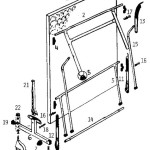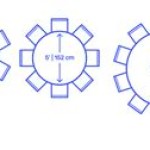Best Vegetable Plants To Grow In Containers
Growing vegetables in containers presents a practical and accessible method for individuals with limited space, challenging soil conditions, or a desire for mobile gardening. Container gardening allows for greater control over soil composition, watering, and sunlight exposure, leading to healthier plants and potentially higher yields. A diverse range of vegetables thrives in containers, making it possible to cultivate a miniature edible garden on balconies, patios, or even indoors.
Selecting the appropriate vegetable varieties for container gardening is crucial for success. Certain vegetables are naturally more compact and adaptable to restricted root space than others. Furthermore, understanding the specific needs of each plant, including light requirements, watering frequency, and fertilization schedules, will optimize growth and productivity. This article will explore some of the best vegetable plants to grow in containers, providing insights into their unique characteristics and cultivation techniques.
Suitable Vegetable Varieties for Container Gardening
Several vegetable varieties are exceptionally well-suited for container gardening due to their compact growth habits, efficient root systems, and ability to produce a bountiful harvest in a limited space. These varieties offer a balanced approach, allowing gardeners to enjoy a rewarding experience without requiring extensive resources or specialized knowledge. The following vegetables represent some of the most popular and reliable choices for container cultivation.
Tomatoes: Determinate or bush tomato varieties are generally preferred for containers, as they exhibit a more compact growth pattern compared to indeterminate, vining types. Determinate tomatoes cease growing at a certain point and produce a concentrated harvest, making them manageable in a container setting. Cherry tomatoes and dwarf varieties are also excellent choices, as they tend to be smaller and more productive in confined spaces. Provide adequate support, such as a stake or cage, to prevent the plants from toppling over due to the weight of the fruit.
Peppers: Bell peppers, chili peppers, and other pepper varieties thrive in containers, provided they receive sufficient sunlight and consistent watering. Pepper plants appreciate well-draining soil and benefit from regular fertilization to support fruit production. Smaller pepper varieties like 'Sweet Palermo' or 'Jalapeno' are particularly well-suited. Ensure the container is large enough to accommodate the pepper plant's mature size, typically at least 12 inches in diameter.
Eggplants: Dwarf eggplant varieties are ideal for container gardening, as they produce smaller fruits on compact plants. Eggplants require warm temperatures and plenty of sunlight to flourish. Use a large container, at least 14 inches in diameter, to accommodate their root system. Support the plants with stakes to prevent them from bending or breaking under the weight of the fruit or in windy conditions. Select varieties such as 'Patio Baby' or 'Hansel' for optimal container performance.
Lettuce and Salad Greens: Loose-leaf lettuce varieties, such as romaine, buttercrunch, and oakleaf, are easy to grow in containers and provide a continuous harvest. Simply snip off the outer leaves as needed, allowing the inner leaves to continue growing. Salad greens prefer cool temperatures and partial shade, making them suitable for growing in spring and fall. A shallow container, at least 6 inches deep, is sufficient for growing lettuce and other salad greens.
Radishes: Radishes are quick-growing vegetables that are perfect for container gardening. They mature in as little as 20-30 days and can be grown in succession for a continuous harvest. Radishes prefer cool weather and well-drained soil. A shallow container, at least 4 inches deep, is adequate for growing radishes.
Spinach: Similar to lettuce, spinach is a cool-weather crop that thrives in containers. It can be grown in spring and fall, providing a steady supply of nutritious greens. Spinach prefers partial shade and well-drained soil. Harvest the leaves when they are young and tender for the best flavor.
Bush Beans: Bush bean varieties are more compact and manageable in containers compared to pole beans, which require extensive support. Bush beans produce a concentrated harvest of beans within a shorter period. Provide a container that is at least 8 inches deep and ensure the plants receive plenty of sunlight.
Herbs: Many herbs, such as basil, mint, parsley, thyme, and oregano, thrive in containers. Herbs are relatively low-maintenance and can be easily incorporated into a container vegetable garden. They prefer well-drained soil and plenty of sunlight. Harvest herbs regularly to encourage bushier growth.
Peas: Bush pea varieties, also known as dwarf peas, are well-suited for containers. They do not require tall trellises like vining pea varieties. Provide a small trellis or support system for the pea plants to climb. Peas prefer cool weather and well-drained soil. Select varieties such as 'Little Marvel' or 'Sugar Ann' for optimal container performance.
Optimizing Container Conditions for Vegetable Growth
Creating the ideal growing environment within a container is crucial for maximizing vegetable yield and quality. This involves careful consideration of factors such as container size, soil composition, drainage, sunlight exposure, and watering practices. By tailoring these elements to the specific needs of each vegetable variety, gardeners can cultivate thriving container gardens that rival traditional in-ground plots.
Container Size and Material: The size of the container directly impacts the root development and overall health of the vegetable plant. Larger containers provide more room for root growth, allowing the plant to access more nutrients and water. A general rule of thumb is to choose a container that is at least 12 inches in diameter and depth for most vegetables, with larger plants like tomatoes and eggplants benefiting from containers that are 14 inches or larger. The material of the container can also influence plant growth.
Terracotta pots are porous, allowing for good air circulation and drainage, but they can dry out quickly in hot weather. Plastic pots are less porous and retain moisture for longer, but they can overheat in direct sunlight. Fabric pots offer excellent drainage and aeration, promoting healthy root growth. Regardless of the material chosen, ensure the container has adequate drainage holes to prevent waterlogging.
Soil Composition and Nutrients: The soil used in containers should be well-draining, nutrient-rich, and lightweight. A soilless potting mix is generally recommended, as it provides good drainage and aeration while retaining moisture. Avoid using garden soil in containers, as it can become compacted and inhibit root growth. Amend the potting mix with compost or other organic matter to improve its nutrient content and water-holding capacity.
Fertilize container vegetables regularly to provide them with the nutrients they need to thrive. Use a balanced fertilizer that contains nitrogen, phosphorus, and potassium. Follow the instructions on the fertilizer package for application rates. Organic fertilizers, such as compost tea or fish emulsion, are also excellent choices for feeding container vegetables.
Watering and Drainage: Consistent watering is essential for container vegetables, as they tend to dry out more quickly than plants in the ground. Water deeply and regularly, especially during hot weather. Avoid overwatering, as this can lead to root rot. Check the soil moisture level regularly by inserting a finger into the soil. If the soil feels dry to the touch, it is time to water. Ensure the container has adequate drainage holes to prevent waterlogging.
Sunlight Exposure: Most vegetables require at least 6-8 hours of sunlight per day to thrive. Place container vegetables in a location that receives ample sunlight. If you do not have enough sunlight, you can supplement with artificial lighting. Rotate the containers regularly to ensure that all sides of the plants receive equal sunlight exposure.
Common Challenges and Solutions in Container Vegetable Gardening
While container gardening offers numerous advantages, it also presents unique challenges that gardeners must address. Understanding these challenges and implementing appropriate solutions can significantly improve the success rate and overall satisfaction of container vegetable gardening. Addressing issues such as pest control, nutrient deficiencies, and environmental factors is essential for maintaining healthy and productive plants.
Pest Control: Container vegetables are susceptible to the same pests that affect in-ground gardens, such as aphids, spider mites, and whiteflies. Monitor plants regularly for signs of infestation. Use insecticidal soap or neem oil to control pests. Companion planting, such as interplanting marigolds with tomatoes, can also help deter pests. Ensure that the containers have adequate drainage to prevent fungal diseases.
Nutrient Deficiencies: Container vegetables can quickly deplete the nutrients in the soil, leading to nutrient deficiencies. Symptoms of nutrient deficiencies include yellowing leaves, stunted growth, and poor fruit production. Fertilize container vegetables regularly with a balanced fertilizer or compost tea. Monitor the pH of the soil and adjust as needed. Add micronutrients, such as iron or magnesium, if necessary.
Environmental Factors: Container vegetables are more susceptible to environmental factors, such as temperature fluctuations, wind, and rain, than plants in the ground. Protect container vegetables from extreme temperatures by moving them indoors or providing shade. Provide support, such as stakes or cages, to protect plants from wind damage. Ensure that the containers have adequate drainage to prevent waterlogging during heavy rain.
By understanding the specific needs of container vegetables and implementing appropriate cultivation techniques, gardeners can overcome common challenges and enjoy a bountiful harvest from their container gardens. Container gardening provides a rewarding and accessible way to grow fresh, healthy vegetables in a limited space.

20 Best Vegetables For Container Gardening Growing In The Garden

The Best 11 Vegetables To Grow In Pots And Containers Gardener S Path

20 Best Vegetables For Container Gardening A Piece Of Rainbow
Vegetables In Containers Rhs Gardening

Choosing The Best Containers For Growing Vegetables

20 Best Vegetables For Container Gardening Growing In The Garden

The Best 11 Vegetables To Grow In Pots And Containers Gardener S Path

How To Grow Veggies In Pots And Planters At Home

Easiest Vegetables To Grow In Flower Pots

Easiest Vegetables To Grow In Flower Pots








